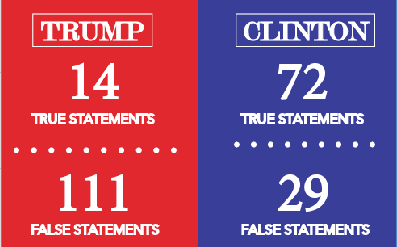Decoding the political lying game
Voters and politicians must check the bias of their own experiences with evidence

Stats from politifact.com
November 21, 2016
As someone who has the opportunity to voice my opinions on the election publicly, I have a moral responsibility to not let my gut reaction overpower my world view and to hold all candidates to the same standard. Unfortunately, throughout this election season, candidates have spread lies to support their points of view.
Completely unsubstantiated claims often become commonly held notions just based on the sheer number of times that candidates and their surrogates repeat them in interviews and speeches.
This phenomenon calls into question the validity of actual facts and statistics. For example, despite the fact that the Bureau of Labor Statistics states that the current unemployment rate across the country is five percent, Trump has claimed a variety of numbers ranging from 28 to 42 percent.
It can be hard to differentiate between fact and feeling when politicians themselves carelessly use the words “I feel” when stating mere hopeful speculations.
We cannot base our decisions off of what we feel to be true because this country is too large and diverse to generalize into one experience, and in many ways that’s the beauty of it. Fake statistics may be reassuring, but we must look beyond our own limited points of view.
I can’t pretend to understand the plight of every single American, so instead of assuming that how I feel and what I see around me translates intoreality, I have to use facts as the underpinning of my opinions.
Examining your biases is one huge step towards maintaining this base of truth. Consider the reasons that people supporting a different candidate than you support that candidate. It can be easy to dismiss them as “deplorables,” but reality is never that simple. Candidates garner support by addressing real problems that people face. While we may not agree with the solutions given, dismissing those problems altogether is counterproductive.
We also need to be able to call candidates out on their lies, especially when we support them. Candidates need to know that voters expect them to be honest, but if we allow lying to benefit them, then they will keep doing it. We can’t truly blame a candidate for doing something that we allow them to do.
Throughout the election season, Fact checkers have been frequently criticized for being too partisan, purely because people don’t want to believe that their candidate is flawed. Ultimately, facts are not like opinions. They literally cannot be biased because then they would no longer be factual.
With only two realistic options, it’s highly unlikely that everyone will truly agree with everything that either candidate says. It is important to recognize where your opinions differ with the candidate you support so that you aren’t under the illusion that they are infallible, because no candidate is.
It’s easy to fall for the politician who tells us what we want to hear and reinforces our existing biases, but we voters need to do more than expect charisma and relatability. We must demand accuracy because now that the election is over, Donald Trump doesn’t get to deal with a world of convenient inaccuracies. He has to deal with reality.
This piece was originally published in the pages of the Winged Post on November 16, 2016.


















![“[Building nerf blasters] became this outlet of creativity for me that hasn't been matched by anything else. The process [of] making a build complete to your desire is such a painstakingly difficult process, but I've had to learn from [the skills needed from] soldering to proper painting. There's so many different options for everything, if you think about it, it exists. The best part is [that] if it doesn't exist, you can build it yourself," Ishaan Parate said.](https://harkeraquila.com/wp-content/uploads/2022/08/DSC_8149-900x604.jpg)




![“When I came into high school, I was ready to be a follower. But DECA was a game changer for me. It helped me overcome my fear of public speaking, and it's played such a major role in who I've become today. To be able to successfully lead a chapter of 150 students, an officer team and be one of the upperclassmen I once really admired is something I'm [really] proud of,” Anvitha Tummala ('21) said.](https://harkeraquila.com/wp-content/uploads/2021/07/Screen-Shot-2021-07-25-at-9.50.05-AM-900x594.png)







![“I think getting up in the morning and having a sense of purpose [is exciting]. I think without a certain amount of drive, life is kind of obsolete and mundane, and I think having that every single day is what makes each day unique and kind of makes life exciting,” Neymika Jain (12) said.](https://harkeraquila.com/wp-content/uploads/2017/06/Screen-Shot-2017-06-03-at-4.54.16-PM.png)








![“My slogan is ‘slow feet, don’t eat, and I’m hungry.’ You need to run fast to get where you are–you aren't going to get those championships if you aren't fast,” Angel Cervantes (12) said. “I want to do well in school on my tests and in track and win championships for my team. I live by that, [and] I can do that anywhere: in the classroom or on the field.”](https://harkeraquila.com/wp-content/uploads/2018/06/DSC5146-900x601.jpg)
![“[Volleyball has] taught me how to fall correctly, and another thing it taught is that you don’t have to be the best at something to be good at it. If you just hit the ball in a smart way, then it still scores points and you’re good at it. You could be a background player and still make a much bigger impact on the team than you would think,” Anya Gert (’20) said.](https://harkeraquila.com/wp-content/uploads/2020/06/AnnaGert_JinTuan_HoHPhotoEdited-600x900.jpeg)

![“I'm not nearly there yet, but [my confidence has] definitely been getting better since I was pretty shy and timid coming into Harker my freshman year. I know that there's a lot of people that are really confident in what they do, and I really admire them. Everyone's so driven and that has really pushed me to kind of try to find my own place in high school and be more confident,” Alyssa Huang (’20) said.](https://harkeraquila.com/wp-content/uploads/2020/06/AlyssaHuang_EmilyChen_HoHPhoto-900x749.jpeg)





